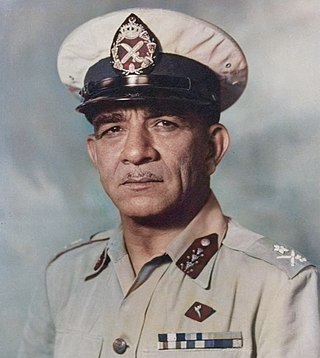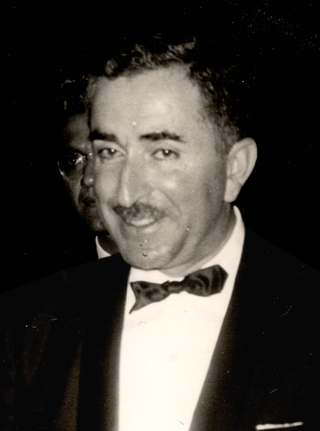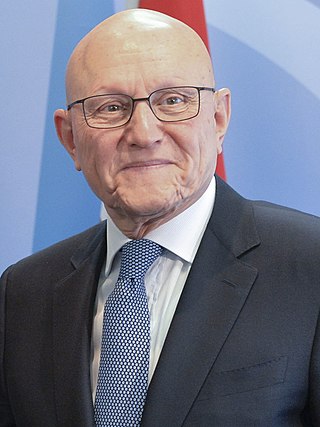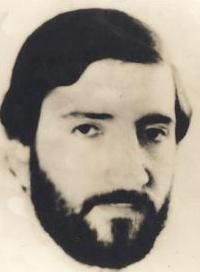Political Islam is any interpretation of Islam as a source of political identity and action. It can refer to a wide range of individuals or groups who advocate the formation of state and society according to their understanding of Islamic principles. It may also refer to use of Islam as a source of political positions and concepts.

Camille Nimr Chamoun OM, ONC was a Lebanese politician who served as President of Lebanon from 1952 to 1958. He was one of the country's main Christian leaders during most of the Lebanese Civil War (1975–1990).

Mohamed Bey Naguib Youssef Qutb El-Qashlan, also known as Mohamed Naguib, was an Egyptian military officer and revolutionary, who along with Gamal Abdel Nasser, was one of the two principal leaders of the Free Officers movement of 1952 that toppled the monarchy of Egypt and the Sudan, leading to the establishment of the Republic of Egypt, and the independence of Sudan, and eventually South Sudan in 2010.

Rashid Karami was a Lebanese statesman. He is considered one of the most important political figures in Lebanon for more than 30 years, including during much of the Lebanese Civil War (1975–1990), and he served as prime minister eight times, making him the most democratically elected prime minister in history according to the Guinness Book of World Records 2005. He was assassinated in 1987.

Juhayman ibn Muhammad ibn Sayf al-Otaybi was a Saudi religious dissident and ex-soldier who led the Ikhwan during their Grand Mosque seizure in 1979. He and his followers besieged and took over the Grand Mosque of Mecca on 20 November 1979 and held it for two weeks. During this time, he called for an uprising against the House of Saud and also proclaimed that the Mahdi had arrived in the form of one of the Ikhwan's leading officials. The incident led to widespread unrest, culminating in large-scale anti-American riots throughout the Muslim world, particularly after Iranian religious cleric Ruhollah Khomeini of the Islamic Revolution falsely claimed over a radio broadcast that Juhayman's insurgency at the holiest Islamic site had been orchestrated by the United States and Israel.

Saeb Salam was a Lebanese politician, who served as Prime Minister six times between 1952 and 1973. Following his death, the Lebanese daily As-Safir described Salam as "most successful in dealing with the media and in presenting a particular image of himself to people on a daily basis through wearing his customary carnation ... and expounding unforgettable slogans", and that he was Lebanon's most popular prime minister after independence leader Riad Al Solh. A significant aspect of Salam was that, unlike other Lebanese leaders, he did not act as a chief over a particular area in the country. Salam fiercely advocated the unity of Lebanon.

Riad Reda Al Solh was the first prime minister of Lebanon after the country's independence. Solh was one of the most important figures in Lebanon's struggle for independence, who was able to unite the various religious groups. He is considered one of the founders of Lebanon.
Betsy Morrell Bryan is an American Egyptologist who is leading a team that is excavating the Precinct of Mut complex in Karnak, at Luxor in Upper Egypt.
Joseph Albert Kéchichian is a political scientist.
Joseph Owens was a Canadian Roman Catholic priest and a philosopher specializing in the thought of Aristotle, Thomas Aquinas, and medieval philosophy.
Karen Pearlman is a film scholar, known for her pioneering work in articulating underlying principles concerning what rhythm in film is and the purpose it serves in modulating cycles of tension and release for viewers. Currently Associate Professor in Screen Production and Practice at Macquarie University, she is the author of Cutting Rhythms, Shaping the Film Edit and its second edition Cutting Rhythms, Intuitive Film Editing.
Fayez Ghosn was a Lebanese politician who served as a minister of defense, and a member of the Marada Movement.

Saadi Al Munla was a Lebanese politician and one of the former Lebanese prime ministers. He also served as minister of economy.

Tammam Saeb Salam is a Lebanese politician who was the Prime Minister of Lebanon from February 2014 until December 2016. He also served as the acting President of Lebanon from May 2014 until October 2016 in his capacity as prime minister. He previously served in the government of Lebanon as minister of culture from 2008 to 2009.

Hussein Al Oweini was a Lebanese businessman and politician who served as Prime Minister of Lebanon twice. He also held other cabinet positions.

Adnan Uqla was a Syrian Islamist insurgent who served as the leader of the Fighting Vanguard; a Sunni militant group connected to the Muslim Brotherhood that led the failed Islamist insurrection in Syria. He was noted as being particularly pious and of being the Vanguard's most charismatic and influential figure.

The Arabian Peninsula People's Union was a Nasserist political party in Saudi Arabia. The APPU was founded in 1959 by Nasser Al Saeed whilst in exile in Beirut. Saeed had been exiled due to his leadership of the ARAMCO strikes in 1956. The APPU was regarded as one of the most important and most diverse opposition groups.
Chamoun (Arabic: شمعون is a Lebanese political family.
Yusuf Yasin was a Syrian journalist and politician who served in various capacities during the reign of King Abdulaziz and King Saud. He was among the advisers of King Abdulaziz who were employed to improve the decision-making process of the state. Yasin performed several roles in the Saudi government until his death in 1962.
Salim Haidar (1911–1980) was a Lebanese jurist and politician who held several cabinet posts during the 1950s, including minister of defense. He was also a member of the Lebanese Parliament.










